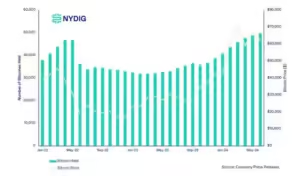Saxony’s Bitcoin Sell-Off: A Small German State Causes Market Distress

Quicktake:
- Saxony, not Germany, has been selling off nearly $3 billion in confiscated Bitcoin.
- The state seized 49,857 BTC from the Movie2k.to case and has sold over half of it.
- Bitcoin sales have led to market distress and significant price drops.
- The sell-off is part of standard procedure for seized assets in criminal investigations.
- Crypto enthusiasts criticize the decision, but Saxony had no choice.
In recent weeks, the cryptocurrency market has been rattled by significant sell-offs, with news reports attributing the sales to Germany. However, it is not the country of Germany but rather the small eastern state of Saxony that is behind the substantial Bitcoin liquidation. This development has sent shockwaves through the market, highlighting the complexities and impacts of state actions on global digital asset prices.
The Confiscation and Its Aftermath
In January, Saxony’s Criminal Police Office (LKA) confiscated a staggering 49,857 Bitcoin, valued at nearly $3 billion at current market prices, from the operator of Movie2k.to. This website was implicated in extensive money laundering and other illegal activities. As part of standard practice for handling assets seized during criminal investigations, Saxony began selling the confiscated Bitcoin.
The sales process, though routine for seized assets, has caused significant distress in the cryptocurrency market. News outlets around the world have reported on the sale of hundreds of millions of dollars worth of Bitcoin, leading to major sell-offs and a notable drop in crypto prices. This situation has sparked considerable debate and criticism among cryptocurrency enthusiasts and market participants.
Saxony’s Forced Hand
Contrary to the widespread perception, it is not the German federal government but the state of Saxony that is selling the cryptocurrency. This distinction is crucial in understanding the context and rationale behind the sales. Saxony, following legal protocols, has no choice but to liquidate the seized assets, including Bitcoin.
A crypto wallet controlled by the German Federal Criminal Police Office (BKA) began transferring thousands of Bitcoin to various exchanges such as Kraken, Coinbase, and Bitstamp about a week ago. This move signaled the state’s intent to sell the assets. Consequently, the wallet’s Bitcoin holdings have dwindled to 23,788 BTC, indicating that over half of the initial holdings have already been sold.
Market Reactions and Criticism
The decision to sell such a large volume of Bitcoin has been met with harsh criticism on social media. Crypto enthusiasts and market analysts have expressed their frustration and disbelief, blaming the state’s actions for the adverse impact on Bitcoin prices.
One user on X (formerly Twitter) remarked, “Germany selling all their #Bitcoin will go down as one of the most retarded things their politicians ever did,” while another criticized, “Germany’s govt officials are literal idiots.” These reactions underscore the strong emotions and financial implications tied to the state’s decision to offload its Bitcoin holdings.
The Broader Implications
The situation with Saxony’s Bitcoin sell-off brings to light several broader implications for the cryptocurrency market and state policies regarding seized digital assets. First, it highlights the potential market impact of large-scale liquidations by governmental bodies. The sale of nearly $3 billion worth of Bitcoin by Saxony demonstrates how actions at the state level can ripple through the global market, causing price volatility and investor concern.
Second, it raises questions about the protocols and strategies used by governments in handling confiscated digital assets. While Saxony is following standard procedures, the significant market reactions suggest a need for more nuanced approaches to minimize disruption. This might include staggered sales, alternative asset management strategies, or improved communication with market participants to mitigate panic and market distortion.
The Legal and Financial Context
Saxony’s actions are rooted in legal obligations to handle seized assets in a manner consistent with existing laws and regulations. When assets are confiscated during criminal investigations, they must be liquidated to recover value, which is then typically allocated to state funds or used to compensate victims. In the case of digital assets like Bitcoin, this process can be particularly challenging due to the volatility and liquidity dynamics of the cryptocurrency market.
The Movie2k.to case, which led to the confiscation, involved extensive illegal activities, including money laundering on a significant scale. The seizure of 49,857 Bitcoin was one of the largest in history, placing Saxony in a unique position. The state’s obligation to sell these assets is a legal necessity, not a discretionary decision, emphasizing the complexities faced by governmental bodies in the digital age.
Future Considerations
As the cryptocurrency market continues to evolve, the Saxony Bitcoin sell-off serves as a critical case study for future policy and procedural considerations. Governments and regulatory bodies worldwide will need to develop more sophisticated frameworks for managing and liquidating digital assets seized during criminal investigations. This includes balancing legal requirements with market stability and investor protection.
Moreover, the incident underscores the importance of clear communication and transparency from state authorities when handling significant digital asset transactions. By keeping market participants informed and adopting measures to minimize market disruption, governments can better manage the implications of their actions on the global financial ecosystem.
Conclusion
The sale of nearly $3 billion worth of Bitcoin by the state of Saxony has highlighted the intricate interplay between state actions and the global cryptocurrency market. While Saxony’s liquidation of the seized Bitcoin is a standard legal procedure, its impact on market prices and the ensuing criticism from the crypto community underscore the need for more refined approaches in handling such assets.
As digital currencies become increasingly integrated into the global financial system, the experiences and lessons from Saxony’s Bitcoin sell-off will inform future policies and practices. Ensuring a balance between legal obligations and market stability will be crucial for governments navigating the complexities of digital asset management in the years to come.



